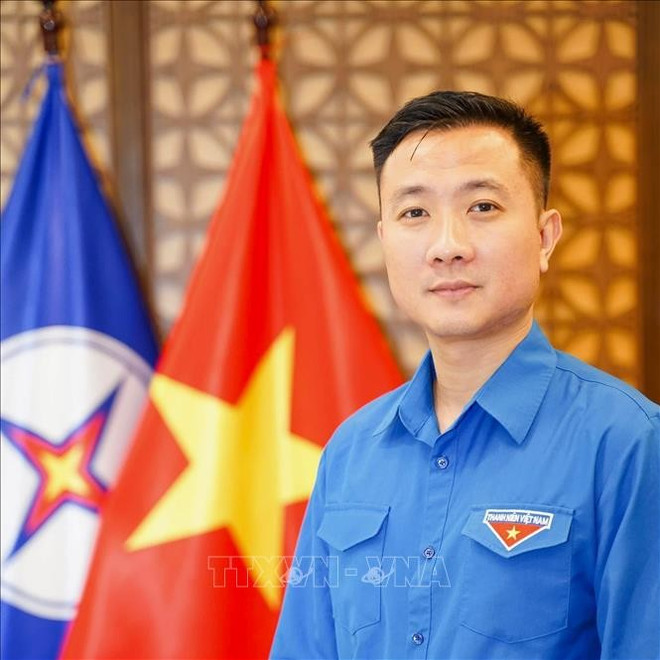As a tech-savvy and innovation-ready force, from start-ups to scientific research and artistic creativity, youth should be given a clearly defined role and responsibilities in the draft documents, with a dedicated section affirming them as the vanguard of innovation and national construction and defence, and as a key driver of socio-economic development in the era of integration and digital transformation.
Nguyen Hoai Dam, secretary of the youth union of Vietnam Television. (Photo: VNA)
By giving opinions to the draft documents for the 14th National Party Congress, each youth union member and young person not only “offer feedback to the Party” but also “act following the Party’s spirit,” turning awareness into concrete actions, and ideas into motivation of renewal.
Nguyen Hoai Dam, secretary of the youth union of Vietnam Television, and Pham Xuan Minh Tri, secretary of the youth union of Vietnam Electricity, affirmed that the draft documents summarise the vivid reality of the country in the “Doi moi” (renewal) period, inspiring strong aspirations for a strong, prosperous and happy Vietnam.
They noted that merging the three reports - the political report, the socio - economic report, and the report on Party building - marks a breakthrough, reflecting the Party’s systematic, comprehensive, and modern mindset in planning national development orientations.
Developing digital skills and creative mindset in youth
Dam expressed particular concern about contents related to young people and the youth workforce, noting that the documents do not include a dedicated section on this issue. He added that policies on education, human resources, science–technology, and innovation remain general in scope.
If the role and position of young people are not clearly defined, and if there are no policies tailored for them, the country risks wasting its greatest creative resource—especially as youth make up more than one-third of the population and nearly half of the workforce, Dam said.
As a tech-savvy and innovation-ready force, from start-ups to scientific research and artistic creativity, youth should be given a clearly defined role and responsibilities in the draft documents, with a dedicated section affirming them as the vanguard of innovation and national construction and defence, and as a key driver of socio-economic development in the era of integration and digital transformation, Dam stressed.
To make youth policies truly effective, he underlined the need for concrete and measurable targets—such as the ratio of youth trained in digital skills, engaged in start-ups and innovation, included in leadership pipelines, or employed in key and hi-tech sectors. Dam noted that embedding these figures in the documents will signal a political commitment and provide a motivating force for young people to strive and contribute.
He also stressed that communication should be a key pillar of Vietnam’s youth development strategy in the digital era, proposing a national communication strategy on youth to provide a platform for young people to voice their opinions, share aspirations, and promote responsibility and patriotism.
 Pham Xuan Minh Tri, secretary of the youth union of Vietnam Electricity. (Photo: VNA)
Pham Xuan Minh Tri, secretary of the youth union of Vietnam Electricity. (Photo: VNA)Special policies to develop young staff in State-owned enterprises
Meanwhile, Tri emphasised that the draft documents should recognise youth as a crucial resource for achieving the nation’s development goals in the digital era and place them at the forefront of the national human resource strategy.
The rapid development of artificial intelligence, automation, green energy, and new economic models is significantly shortening the time needed to acquire and master knowledge, enabling young people to quickly adopt advanced technologies and directly boost productivity and growth quality, Tri said, adding that this creates a favourable environment for Vietnamese youth to become a key driving force in the country’s industrialisation, modernisation, and growth model innovation.
Tri said youth should be recognised as a central force in implementing the four major transformations outlined in the draft documents - digital, green, energy, and human resource structure and quality transformations. He noted that the combination of their knowledge, creativity, adaptability, and dedication is a decisive factor in making these transformations effective and generating new momentum for the economy.
He proposed that the draft documents adopt a long-term strategy for young labour force development, focusing on advanced training in core technologies, encouraging youth participation in great and challenging national projects, providing policy frameworks that foster bold innovation and accountability, and establishing mechanisms to assess and utilise talent based on practical skills and work effectiveness.
Tri also suggested the draft documents emphasise assigning breakthrough tasks to the youth to not only fully tap their potential effectively, but also motivate them, fostering their aspiration, responsibility, and a spirit of dedication./.